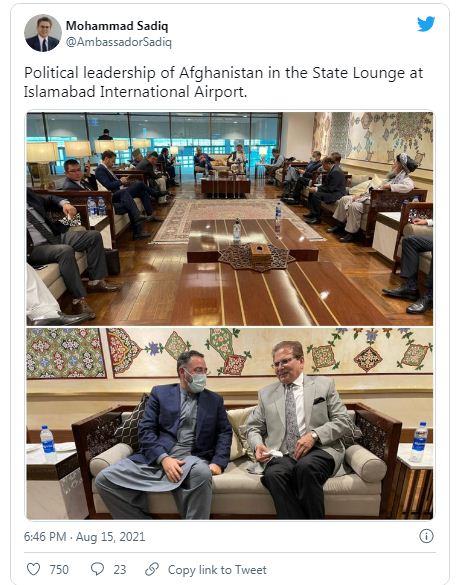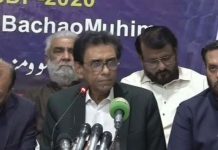KABUL, AUG 15: Afghanistan’s embattled President Ashraf Ghani fled the country on Sunday as the Taliban moved further into Kabul, officials said.
Ghani flew out of the country, two officials told The Associated Press, speaking on condition of anonymity as they weren’t authorised to brief journalists. Abdullah Abdullah, the head of the Afghan National Reconciliation Council, later confirmed Ghani had left in an online video.
“He left Afghanistan in a hard time, God hold him accountable,” Abdullah said.
Major developments today
- Ashraf Ghani flees Afghanistan
- Taliban say they will not take Kabul “by force”
- Taliban negotiators head to presidential palace to discuss transfer of power
- Taliban spokesperson says they are seeking an unconditional surrender from the govt
- Helicopters begin landing on US Embassy for evacuation
- Taliban seize Jalalabad
Reuters quoted a senior interior ministry official as saying that Ghani “has left the capital Kabul for Tajikistan”. It is unclear whether Ghani has resigned from the post of president.
Asked for comment, the president’s office said it “cannot say anything about Ashraf Ghani’s movement for security reasons”. A representative of the Taliban said the group was checking on Ghani’s whereabouts.
In a video posted on Facebook, Abdullah, speaking in Persian, appealed to the Afghan security forces to do their part to maintain peace in the country. He also appealed to the Taliban to not harm anyone or cause disharmony in Kabul. He said Ghani had left the country in troubling times, for which he will be remembered in history.
Ghani’s countrymen and foreigners alike also raced for the exit, signalling the end of a 20-year Western experiment aimed at remaking Afghanistan.
After entering Kabul earlier today, Taliban fighters sought the unconditional surrender of the central government.
The beleaguered government, meanwhile, hoped for an interim administration, but increasingly had few cards to play. Civilians fearing that the Taliban could reimpose the kind of brutal rule that all but eliminated women’s rights rushed to leave the country, lining up at cash machines to withdraw their life savings.
The Taliban ordered their fighters to enter Kabul to prevent looting after local police deserted their posts, a spokesman for the militant group, Zabihullah Mujahid, said in a statement.
In a nationwide offensive that has taken just over a week, the Taliban have defeated, co-opted or sent Afghan security forces fleeing from wide swaths of the country, even though they had some air support from the US military.
The lightning speed of the push has shocked many and raised questions about why Afghan forces crumbled despite years of US training and billions of dollars spent. Just days ago, an American military assessment estimated it would be a month before the capital would come under insurgent pressure.
Provincial capitals in Taliban control
On Sunday, Taliban spokesman Suhail Shaheen told Qatar’s Al-Jazeera English satellite news channel that the insurgents are “awaiting a peaceful transfer of Kabul city”. He declined to offer specifics on any possible negotiations between his forces and the government.
But when pressed on what kind of agreement the Taliban wanted, Shaheen acknowledged that they were seeking an unconditional surrender by the central government.
Taliban spokesman Mujahid said the group was in talks with the Western-backed government for a peaceful surrender. “Taliban fighters are to be on standby on all entrances of Kabul until a peaceful and satisfactory transfer of power is agreed,” he said in a statement.
Ali Ahmad Jalali, a US-based academic and former Afghan interior minister, could be named head of an interim administration in Kabul, three diplomatic sources said, though it was unclear whether the Taliban had agreed.
For his part, Afghanistan’s Interior Minister Abdul Sattar Mirzakwal said the government will enter into talks with the Taliban for the peaceful transition of power.
In a video statement shared on Twitter, Mirzakwal said, “As the Minister of Interior of Afghanistan, I ordered all security forces, special forces and other personnel to continue their duties in different places to ensure the security of the city. Our people should not worry. There is no security problem in the city at the moment.”
He underlined that Kabul remains under government control and that the Taliban would not attack the city, adding that the transition of power would also happen peacefully for a transitional government to be set up.
Meanwhile, Taliban negotiators headed to the presidential palace to discuss the transfer, said an Afghan official who spoke on condition of anonymity. It remained unclear when that transfer would take place.
The negotiators on the government side included former president Hamid Karzai and Abdullah Abdullah, the head of the Afghan National Reconciliation Council, an official said. Abdullah has long been a vocal critic of Ghani, who has refused giving up power to get a deal with the Taliban.
The official, who spoke on condition of anonymity to discuss details of the closed-doors negotiations, described them as “tense”.
Meanwhile, acting Defence Minister Bismillah Khan sought to reassure the public in a video message.
“Authority has been given to a delegation that will be going to Doha (Qatar) tomorrow to reach an agreement on Afghanistan,” he said. “I assure you about the security of Kabul.”
Earlier, the insurgents also tried to calm residents of the capital.
“No one’s life, property and dignity will be harmed and the lives of the citizens of Kabul will not be at risk,” the insurgents said in a statement.
On Sunday, an Afghan political delegation led by Wolesi Jirga Speaker Mir Rahman Rahmani arrived in Pakistan.
The delegation was received by Pakistan’s Special Representative for Afghanistan Mohammad Sadiq, who said on Twitter that the visiting group included Salahuddin Rabbani, Mohammad Yunus Qanooni, Ustad Mohammad Karim Khalili, Ahmad Zia Massoud, Ahmad Wali Massoud, Abdul Latif Pedram, Ustad Mohammad Mohaqiq and Khalid Noor.
“Matters of mutual interest will be discussed during the Afghan political leadership’s visit,” Sadiq added.

Panic in Kabul
Despite the pledges, panic set in as many rushed to leave the country through the Kabul airport, the last route out of the country as the Taliban now hold every border crossing. Rapid shuttle flights of Boeing CH-47 Chinook helicopters near the embassy began a few hours later after the militants seized the nearby city of Jalalabad. Diplomatic armoured SUVs could be seen leaving the area around the post.
The US State Department did not immediately respond to questions about the movements. However, wisps of smoke could be seen near the embassy’s roof as diplomats urgently destroyed sensitive documents, according to two American military officials who spoke on condition of anonymity because they were not authorised to discuss the situation. The smoke grew heavier over time in the area, home to other nations’ embassies as well.
Pakistan ‘closely following’ situation
Meanwhile, Pakistan said it was “closely following the unfolding situation” in Afghanistan, and would continue to support the efforts for a political settlement.
“We hope all Afghan sides will work together to resolve this internal political crisis,” the Foreign Office said in a statement.

It said the Pakistan embassy in Kabul was “extending necessary assistance” to Pakistanis, Afghans and the diplomatic and international community for consular work and coordination of PIA flights.
A special inter-ministerial cell has been established in the Ministry of Interior to facilitate visa/arrival matters for diplomatic personnel, UN agencies, international organisations, media and others, it added.
Speaking about the situation in Afghanistan at a press conference in Multan, Foreign Minister Shah Mahmood Qureshi said Pakistan had repeatedly emphasised that Afghanistan’s problems “have no military solution”.
“The world and Pakistan are on the same page, that the Afghan issue be solved through talks and negotiation and a transitional setup emerges in a peaceful way which is inclusive and broad-based,” he said.
Terming the ongoing crisis “moments of trial” for the Afghan leadership, the minister said Pakistan hoped that Afghan citizens’ rights were protected and the problem was solved through talks.
Qureshi said Islamabad had played the role of a facilitator in the peace process, and its diplomatic outreach would continue. “After Ashura, I will contact different Afghan neighbours and exchange thoughts so we can go toward a peaceful solution,” he added.











